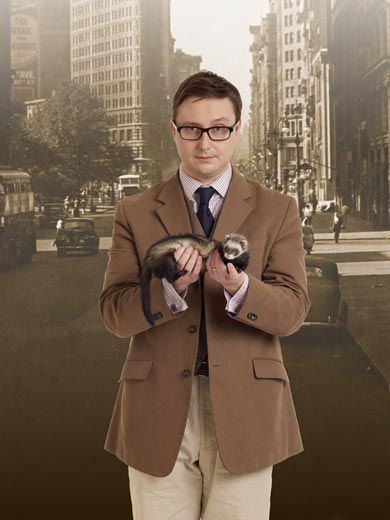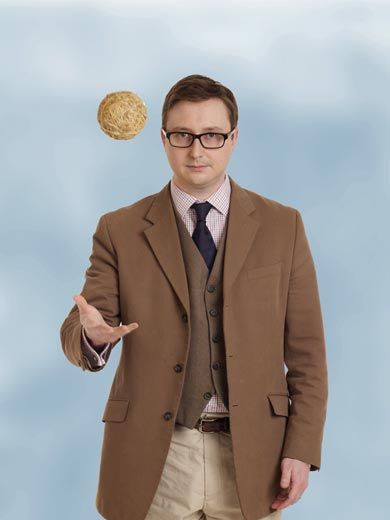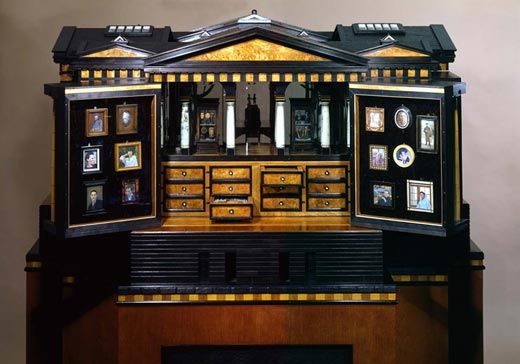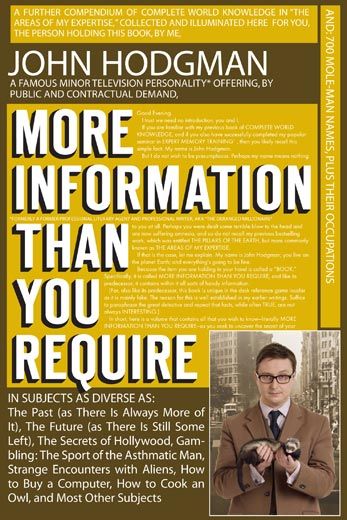John Hodgman Gives “More Information Than You Require”
John Hodgman, best recognized as the “PC” in the Apple advertising campaign, discusses how humans distinguish fact from falsehood
/https://tf-cmsv2-smithsonianmag-media.s3.amazonaws.com/filer/hodgman_interview_631.jpg)
John Hodgman is perhaps most recognizable for his role as “PC” in Apple’s ubiquitous advertising campaign. But he is also an author of two compendia of fake facts, including the recently published “More Information Than You Require.”
Hodgman, a former literary agent, got his start as a professional writer and humorist writing for McSweeney’s, the literary and humor publishing company founded by writer Dave Eggers. He became a regular guest on The Daily Show with Jon Stewart as the resident expert with fake authority.
We spoke with Hodgman about why people love trivia, the future of museums, and where he finds his inspiration for humorous, yet false, statements about presidents who had hooks for hands.
Many of the fake facts you have in your book require a strong cultural knowledge to get the joke. When studies come out showing that people who watch The Daily Show with Jon Stewart are among the most knowledgeable about current events, the same principle applies. To get the joke, you need to be culturally aware. Do you write with that in mind?
I have a lot of cultural references that have amassed in my brain like shrapnel over the years that are meaningful to me. Part of the joke is speaking about references to Watership Down and my half-remembered trivia about how Groucho Marx never wore a mustache until he actually had to go on TV, or Thomas Jefferson inventing macaroni & cheese, which may or may not be true. And to talk about them with such bold authority that if people have never heard that before, they are tempted to feel like they’ve heard it before.
So, I don’t really feel that it is only for initiates, but rather I have that sort of bold authority of the crazy person.
And the idea is that the joke may work one way for people who know the facts and another way for people who do not know the real truth?
If in my book people come across facts that confuse them -- that they may not have heard before -- there are two possibilities. One is that I have made it up. Two is that it is true or half-true, or based in some truth but they had not heard it before. My hope is that will at least confuse them, because that is part of the effect. If they were to chase it down using the Internet, perhaps that would enrich their enjoyment of the joke.
Where do you go to get your general knowledge?
A lot of it is mined from bits of trivia and lore and half-truths that I’ve collected over the years. I think that humans, as much as they take learning froorm universities, colleges, high schools and museums, they also just pick stuff up along the way, and that is the nature of the urban legend.
I think trivia is a kind of folklore, little bits of received wisdom about things like George Washington chopping down a cherry tree and not lying about it, for example. That’s not told in schoolbooks because it’s not true; we all know that it’s not true anymore. It was written once -- by Parson Weems in his biography of George Washington, which was largely false and mythological. But now it’s passed down, orally, as a lot of trivia is. And it gets to our brains, and apparently as a species we have a hunger for useless knowledge because we store up a lot of it – so we would have something to talk about at a cocktail party or with a stranger on an airplane.
But generally speaking, I first try to mine all the stuff I’ve packed my brain with over the years, and when that isn’t sufficient, there is the Internet, as that is a great source of dubious scholarship.
Ok, but let’s say that someone at a cocktail party or next to you on a plane says something crazy like, Theodore Roosevelt had a hook for a hand. (p. 299 of ‘More Information Than You Require’) Where would you go to verify that fact?
That is a fact that I obviously made up, so there isn’t a place to verify it other than my book, which should be proof enough.
But, the “Presidents Who have Hooks for Hands” was one of the very first ideas that came to me as a proof of concept list of fake trivia, that encouraged me to write the first book [Areas of My Expertise]. Of course in the new book, I have quite a bit on the United States Presidents because they are all ridiculously eccentric men, and now women as well, deformed by their ambition. And, perhaps, not so deformed that they have a hook for a hand, but there is that sense that once someone starts running for President, you see their physical transformation.
Obama has gone horribly gray compared to where he was just 18 months ago and John McCain – the toll of the campaign trail is clearly visible on his face and constitution. And I think that they enter another place as humans where they become something other than the rest of us. People who run for president seriously and people who become President enter a bizarre secret society in which they have had an experience that none of us will ever have. What better way to show your allegiance to a secret society than to cut off your right hand and replace it with a hook.
We are now in a “truthiness” era of a post-modern version of what are actually facts and you’ve seen it in the political race and all over the Internet. Do you think your book could have succeeded, or even have been written, prior to this informational revolution?
It certainly would not have been written without the Internet for a very practical reason, which is that were it not for the Internet, I most likely would still be a professional literary agent in New York City. The walls are breaking such that we are living in a revolutionary time in all sorts of media, thinking just particularly of writing, if people do not care about money they can write whatever they want and find a worldwide audience for very little investment, without going through the process of finding an agent and finding a publisher. As a result you see much more diversity of voices and forms and kinds of storytelling than you ever did before the Internet.
That’s sort of a philosophical point of view of why I would still be a literary agent, but practically, were it not for the Internet, I never would have discovered Dave Eggers and McSweeney’s, especially McSweeneys.net, which is where I developed this voice of fake authority, in the Ask a Former Professional Literary Agent column that I wrote.
Don’t get me wrong, there has been fake authority for as long as there has been authority. Even just within the realm of comedy, you have Peter Cook’s great character “E.L. Wisty” and you have Professor Irwin Corey.
Only after the fact, after I finished writing my first book did I appreciate that this amalgam of book form of half-truths, strange unbelievable tales in lists, half-formed sentences, and snippets of tiny articles and everything else sort of resembled a low-tech version of the Internet itself.
And only after discovering that did I appreciate that what it really resembled was a low-tech version of the Internet that preceded it, the old Farmer’s Almanac, the North American Almanac, the Worlds of Wisdom, the People’s Almanac, and all of those books that existed to collect these folkloric bits of story and factoid before the Internet came along to take over that business.
What’s your favorite museum? What would be in the John Hodgman Museum?
Walking around the Hall of Presidents in the National Portrait Gallery was really remarkable. Those are the iconic images that you certainly have of the earliest Presidents, even the later presidents as well; those are the pictures that get etched in your mind that define those human beings as they recede from human-ness into their weird status of civil/secular half-god Presidency. That’s remarkable to actually see those images of Lincoln and Washington and Jefferson and particularly Grover Cleveland. What American does not know that painting by heart?
What would I put in a museum? Probably a museum! That’s an amusing relic of our past. Apparently we no longer need to go to museums to commune with the authentic relics of an actual past. We are more than happy to just make up the facts for ourselves these days.
You write, as John Hodgman – an exaggerated form of the former professional literary agent – that “Reality, while generally probable, is not always interesting.” And albeit a humorous line, there is some truth to it. So how do museums and institutions of learning make reality interesting?
There was a work of art that was commissioned by the gallery; it was essentially a diorama that attempted to replicate the museum itself if not in its direct form. [David Beck’s MVSEVM] That was the most remarkable thing I’ve seen in years, because it represents the reality of the museum as filtered through a creative mind. I just found it to be so maniacally meticulous that it stirred every cockle in me. It was fantastic.
Stephen Colbert, coiner of the word “truthiness,” a word that fits your two volumes of “facts” nicely, had his portrait hung in the Smithsonian National Portrait Gallery next to the Hall of Presidents, in between the bathrooms. Did he belong there?
When is there going to be a picture of me?
I do not think that a museum needs to engage with pop culture in order to make itself interesting to museumgoers. Museums are already interesting and engaging with pop culture for its own sake is just a quick way to seem and become dated. While Colbert will certainly stand the test of time, there are many others even John Hodgman who will not. That said, museums are intrinsically interesting, but what museums lack, and what I think is more important, in the museum experience is a sense of humor, a sense of play. Not necessarily a lot of jokes, but a sense of whimsy, much like that model, much like hanging Stephen Colbert over by the bathrooms. That’s not an effective exhibit because it references something that’s on TV right now, that’s an effective exhibit because it’s a great joke. And great jokes are perhaps the most enduring stories that we have in humanity; they last as long as any great novel, and people will respond to a great joke no matter what.
Inviting people to play, whether it’s with clever jokes or smartly curated exhibits, people will respond to it. I think the idea – trivia itself is playful, it is by definition trivial. It does not require much from the hearer other than a benign curiosity of the past. Maybe a lot more presidential trivia in the Hall of Presidents, but there were a lot of people walking around looking at those portraits, so I don’t know if that’s even necessary.
People like trivia and they like being able to engage history through fascinating, unbelievable, but true facts. Or fascinating unbelievable, but false facts.
/https://tf-cmsv2-smithsonianmag-media.s3.amazonaws.com/accounts/headshot/brian.png)




/https://tf-cmsv2-smithsonianmag-media.s3.amazonaws.com/accounts/headshot/brian.png)